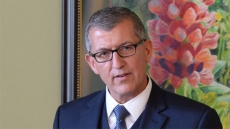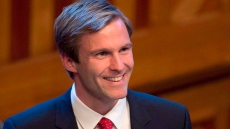OTTAWA — Finance ministers from Canada's two biggest provinces urged Ottawa to dig deeper into its pocket for infrastructure cash as they headed into a meeting Monday with their federal counterpart.
Provincial and territorial finance ministers from across the country gathered in Ottawa with federal Finance Minister Joe Oliver to discuss pressing issues such as infrastructure and the sliding price of oil.
Before the meeting, Quebec Finance Minister Carlos Leitao asked for additional federal cash for public transit, roads, bridges and the like — even if Ottawa has to take out loans to pay for it.
"I think it makes sense for a government to borrow to build a bridge or to build a highway or to build a tunnel," said Leitao, who expected infrastructure to be a focus of Monday's talks.
"The federal government has the capacity to do so."
On his way into the meeting, Ontario Finance Minister Charles Sousa called on the federal government to create a national strategy on infrastructure.
Sousa said stimulus should continue to flow to ensure Canada makes a full economic recovery.
"We're going to asking the federal government to work with us in infrastructure projects, in infrastructure strategy, to ensure that we make those investments," Sousa said.
Sousa has also accused the federal government of shortchanging Ontario last year on transfer payments.
Before Monday's get-together, Oliver announced the federal government will increase transfers to the provinces next year, bringing the total to almost $67.9 billion — up from about $64.8 billion last year.
The figures said Ontario will receive about $1.25 billion more in federal transfer payments next year.
Oliver said 20 cents out of every tax dollar paid to the federal government in 2015-16 will be transferred to provinces and territories. The cash includes health, social and equalization transfers.
"These financial payments are only one part of our partnership with provinces," said Oliver, who pointed to the Harper government's infrastructure promises, including the $53-billion New Building Canada Plan.
"We've also, for example, made historic investments in infrastructure and we will invest over $75 billion in infrastructure over the next decade."
A spokesman for Oliver later said the federal government helps fund these projects, but noted the provinces and municipalities are responsible for more than 95 per cent of public infrastructure.
During the talks, the finance ministers were also expected to explore the potential consequences of sinking oil prices, which has contributed to the falling dollar.
Some provinces will see benefits from the low price of crude in the form of cheap gas at the pump and a better environment for exporters.
On the other hand, the bottom lines of oil-producing provinces and the federal government have taken financial hits from the rapid fall in crude prices.
On balance, experts say the sharp drop in oil prices since the summer has been a net negative for Canada. On Monday, the oil was below US$60 a barrel, compared to its US$107 price tag in June.
Oliver maintained his department is monitoring price changes closely, but he maintained Ottawa is still on track to run a budgetary surplus next year.
He wouldn't say how low oil would have to go before the federal government could no longer be able to fulfil that promise.
"I'm not prepared to come up with a number at this point," Oliver said.
"I don't want to engage in negative hypotheticals. The oil market is quite volatile now and I don't want to make any assumptions about further declines."





